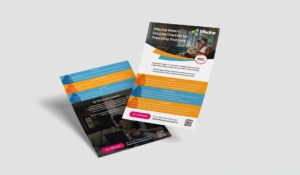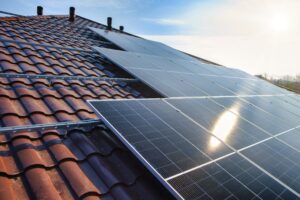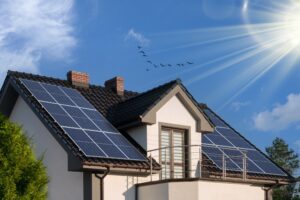Government Grants For Home Improvements
There are multiple different government grant avenues to pursue that can help you make affordable home improvements, as long as you meet the eligibility criteria.
These grants available to UK households, depending on different eligibility criteria, can help make homes more energy efficient and reduce their carbon footprint.
A grant to fund energy efficiency home improvements can bring various benefits for households including:
- Experience savings on your energy bills.
- Decrease the carbon footprint of your household.
- Ensure your home is properly insulated to regulate temperature efficiently throughout the year.
- Reducing condensation in your home can help prevent damp and mould.
In the UK there are four main free grants schemes designed to assist with energy efficiency home improvements, including ECO4, the Great British Insulation Scheme, the LA Flex Scheme, and the Boiler Upgrade Scheme. Plus there may be funding available for those with a disability of some sort under the Disabled Facilities Grant.
ECO4 Scheme
The ECO4 scheme is a government initiative under the Energy Company Obligation (ECO) Scheme aimed at reducing domestic household emissions and energy bills and generally improving the warmth and energy efficiency of households in the United Kingdom.
Through the ECO4 scheme, funded by the main energy suppliers, low-income and vulnerable households can access free energy efficiency funding for a range of measures including:
- Insulation (especially loft and cavity wall insulation).
- Air source heat pumps.
- Smart thermal controls.
- Solar panels.
- Boiler replacements.
ECO4 Eligibility
The ECO4 scheme is primarily focused on improving the homes of low-income families and vulnerable community members and funding comes from the main energy companies. The eligibility criteria for ECO grants are designed to align with this objective.
In order to receive home improvement energy efficiency measures through the ECO4 government scheme, certain criteria must be met including:
- Residing in a property with an Energy Performance Certificate (EPC) rating of D or lower.
And either:
- The maximum combined household income allowed is £31,000 or less.
- Or at least one member of the household must receive one of the following benefits: Child Benefits, Child Tax Credit (CTC), Housing Benefit (newly eligible under ECO4), Income-based, Jobseekers Allowance (JSA), Income-related Employment and Support Allowance (ESA), Income Support, Pension Credit Guarantee Credit, Pension Credit Savings Credit (newly eligible under ECO4), Universal Credit (UC), Warm Home Discount Scheme Rebate, Working Tax Credit (WTC).
The Great British Insulation Scheme (GBIS)
The Great British Insulation Scheme (GBIS), formerly the ECO+ scheme, is a scheme designed to help households save money and improve living conditions in the least energy efficient properties through the installation of insulation measures. Administered by Ofgem, the new scheme aims to address fuel poverty and decrease household energy costs.
GBIS covers various insulation methods that can be implemented in homes, including cavity wall, solid wall, loft, and underfloor insulation. In addition, individuals in low-income households who meet the eligibility criteria may also qualify for claiming heating controls, such as room thermostats as a secondary measure.
Great British Insulation Scheme grant eligibility
The GBIS initiative expands on ECO4 to reach a wider demographic in the UK. Eligibility criteria is divided into two groups as a result.
Low-income Eligibility Group:
To qualify for the free energy efficiency method through the GBIS initiative as part of the low-income eligibility group, a household member must receive at least one of the specified qualifying benefits.
This includes: Child Benefit, Pension Guarantee Credit, Income-related Employment and Support Allowance, Income-based Jobseeker’s Allowance, Income Support, Tax credits, including child tax credits and working tax credits, Universal Credit, Housing Benefit and Pension Credit Saving Credit.
General Eligibility Group:
If you do not meet the low-income eligibility criteria, there is a second option available for eligibility. To qualify for an energy efficiency method, you must meet the general group criteria.
- Reside in a property with an EPC rating of D or lower.
- In England, Council Tax bands range from A to D.
- Properties in Wales and Scotland are assigned to Council Tax bands A to E.
LA Flex Scheme
The Local Authority Flexible Eligibility (LA Flex) scheme is an extension of the government’s ECO scheme. Unlike the ECO4 and GBIS initiatives, which have pre-set eligibility criteria determined by the government, LA Flex allows local authorities to set their own criteria. This flexibility has enabled more residents to qualify for free energy efficient improvements for their homes.
For those living in homes with low energy efficiency who do not qualify for the mentioned schemes, the LA Flex initiative may be a suitable option.
The LA Flex Scheme covers home improvements.
The LA Flex scheme offers similar energy efficiency methods to the ECO initiative, but specific rules and available home improvements may vary depending on your local authority. Typically, the following home improvements are offered through the LA Flex scheme:
- New central heating systems.
- Insulation to improve energy efficiency.
- Free boiler replacements.
- Consider upgrading your current central heating system.
LA Flex Scheme eligibility.
Local authorities have the flexibility to set their own eligibility criteria for the LA Flex scheme, based on the needs of their residents. To determine if you qualify for free energy efficiency measures, contact your local authority.
Boiler Upgrade Scheme
For those who do not need additional home insulation, it may be worth exploring the free boiler upgrade schemes available. The ECO4 and LA Flex schemes offer free boiler upgrades, and there is also the Boiler Upgrade Scheme targeting UK residents with new boilers or alternative heating options like heat pumps. The Boiler Upgrade Scheme, also known as BUS, aims to support the decarbonisation of heat in households and buildings.
What does the Boiler Upgrade Scheme cover in terms of home improvements?
The Boiler Upgrade Scheme provides funding towards heat pumps and biomass boilers for installation in households and non-domestic buildings in England and Wales. The initiative offers three main types of boiler upgrades.
- Air source heat pumps (up to £7,500).
- Ground source heat pumps (up to £7,500).
- Biomass boilers (up to £5,000).
Boiler Upgrade Scheme eligibility
To be eligible for the Boiler Upgrade Scheme, individuals must meet the following criteria:
- Applicants must have ownership of the property they are applying for, whether it be their primary or secondary residence, business location, or rental property.
- The new heating system must be installed on or after April 1, 2022. Eligibility is maintained even if the system is planned but not yet installed.
- You are upgrading to a more energy-efficient heating system by replacing fossil fuels with an alternative source of energy (electric, solar, etc.).
- There should be no unresolved issues with cavity wall or loft insulation on your property.
- Many new-build and social properties do not meet the eligibility requirements.
Individuals interested in installing a biomass boiler should ensure that their property meets necessary requirements.
- Transition to an off-grid energy source.
- Be situated in a rural area.
- The emissions certificate for your boiler must demonstrate that polluting emissions are maintained at a minimum level.
It should be noted that biomass boilers are not suitable for installation in self-built homes.
Other Government grants are available for home improvements.
Various schemes are currently available to make energy efficiency improvements, but there is funding available to help those with disabilities. With a Disabled Facilities Grant, you could get a grant from the local authority if you have a disability and need to make essential changes to your home in order to continue to live there.
A disabled facilities grant won’t affect any benefits you get and could help with measures such as widening doors, adding handrails, improving access, building extensions, or even providing a heating system suitable for your needs.
Disabilities include a range of conditions including physical disability, learning disability, age-related need, autism, cognitive impairment, progressive conditions, terminal illness, or mental health condition. You should apply to your local authority for a disabled facilities grant.
Need professional advice?
Energy grants and other home improvement funding from government-backed schemes can be difficult to understand, but doesn’t need to be that difficult. Effective Home can help you understand the different funding avenues and whether you might be eligible.
For households, if you are a low income household or live in a low energy efficiency home, there is a good chance you will qualify for funding. If you are a tenant, you may still be eligible for certain energy efficiency measures, with your landlord’s permission. Enquire with Effective Home today and see what we can do for you.



